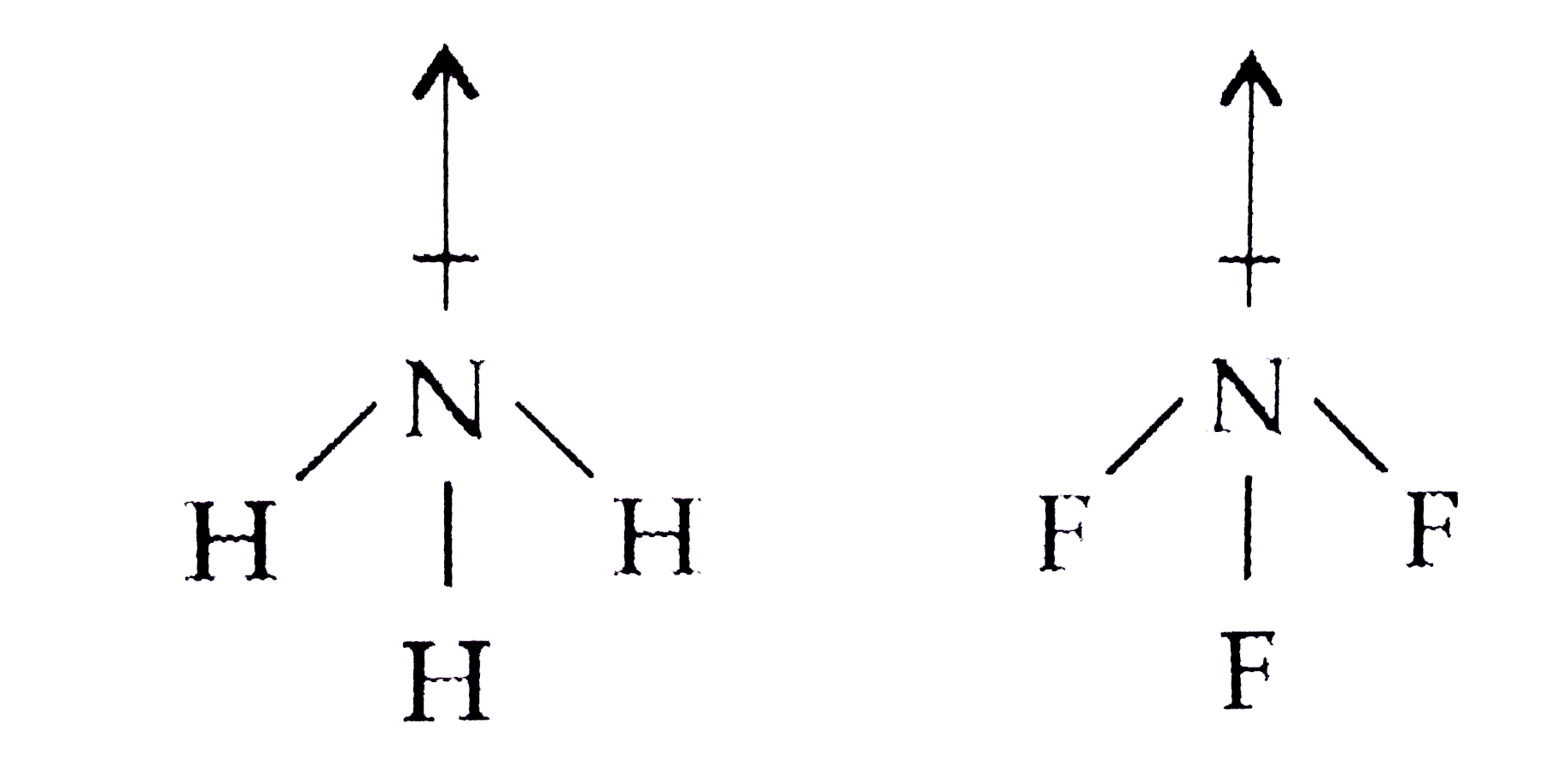Although fluorine is much more electronegative than hydrogen yet the dipole moment of (0.24 D) is much lower than that of (1.46 D). Explain.
The dipole moment of molecules having lone pairs and polar bonds is the vector sum of the following two moments.
(i) Dipole moment of the lone pair/s
(ii) Resultant of the dipole moments of polar bonds.
Now both have pyramidal structures with FNF and HNH bond angles of respectively. The direction of the dipole moment of the lone pair is in the same direction, i.e., away from the N atom as indicated in the Figure

Sine, N is more electronegative the H, therefore, the direction of the N-H bond moments is from H to N. The resultant of these three bonds adds to the moment of lone pair and hence the net dipole moment of is 1.46 D.
In contrast, F is more electronegative than N and hence the direction of the N-F bond moments is from N to F/ Tje resultant of the dipole moments of the three N-H bonds in . In other words, the only difference is that in cas of , the dipole moments of three N-H bonds adds to the dipole moment of lone pair but in case of , it opposes the dipole moment of the lone pair. Consequently, has a much lower dipole moment (0.24 D) than that if (1.46 D).
Topper's Solved these Questions
- BOOK - PRADEEPCHAPTER - P-BLOCK ELEMENTS EXERCISE - NCERT QUESTIONS AND EXERCISES WITH ANSWERS96videos
P-BLOCK ELEMENTS
- BOOK - PRADEEPCHAPTER - P-BLOCK ELEMENTS EXERCISE - MCQ - I27videos
P-BLOCK ELEMENTS
- BOOK - PRADEEPCHAPTER - P-BLOCK ELEMENTS EXERCISE - FILL IN THE BLANKS34videos
P-BLOCK ELEMENTS
- BOOK - PRADEEPCHAPTER - ORGANIC COMPOUNDS CONTAINING NITROGENEXERCISE - IMPORTANT QUESTIONS FOR BOARD EXAMINATION27videos
ORGANIC COMPOUNDS CONTAINING NITROGEN
- BOOK - PRADEEPCHAPTER - POLYMERSEXERCISE - IMPORTANT Questions (For Board Examination)27videos
POLYMERS
Similar Questions
Although fluorine is much more electronegative than hydrogen yet the dipole moment of NF3 (0.24 D) is much lower than that of NH3 (1.46 D). Explain.
View SolutionAlthough F is more electronegative than H , then
resultant dipole moment of NH3 is much moe than
that of NF3 . It can be explained as
 View Solution
View Solution
Knowledge Check
- Question 1 - Select One
Dipole moment of NF3 is smaller than :
ANH3BCO2CBF3DCCl4 - Question 2 - Select One
The dipole moment of NF3 is very much less compatred to that of NH3 because :
Athe size of N atom is much less than that of H atomBF atom is more electronegative than N atoms whereas H atoms is less electronegative tha N atomCunshared electron pair is not present in NF3Dno. of lone pairs in NF3 is nuch greater than in NH3 - Question 3 - Select One
The dipoles moment of NF3 is less than NH3 because
ANH3 forms associated moleculesBF is more reactive then HCThe resultant of bond polarity is lessDThe resultant in individual polarities is opposed by the polarity of lone pair
Dipole moment of NH3 is more than that of NF3, Explain.
View SolutionDipole moment of CH3F is less/more than that of CH3CI.
View SolutionDipole moment of CH3F is less/more than that of CH3CI.
View SolutionThe dipoles moment of NF3 is less than NH3 because
View SolutionThe electronegaivity difference between N and F is greater than that between N and H yet the dipole moment of NH2 ( 1 .5 D) is larger than that of NF3(0.2D). This is because :
View Solution

